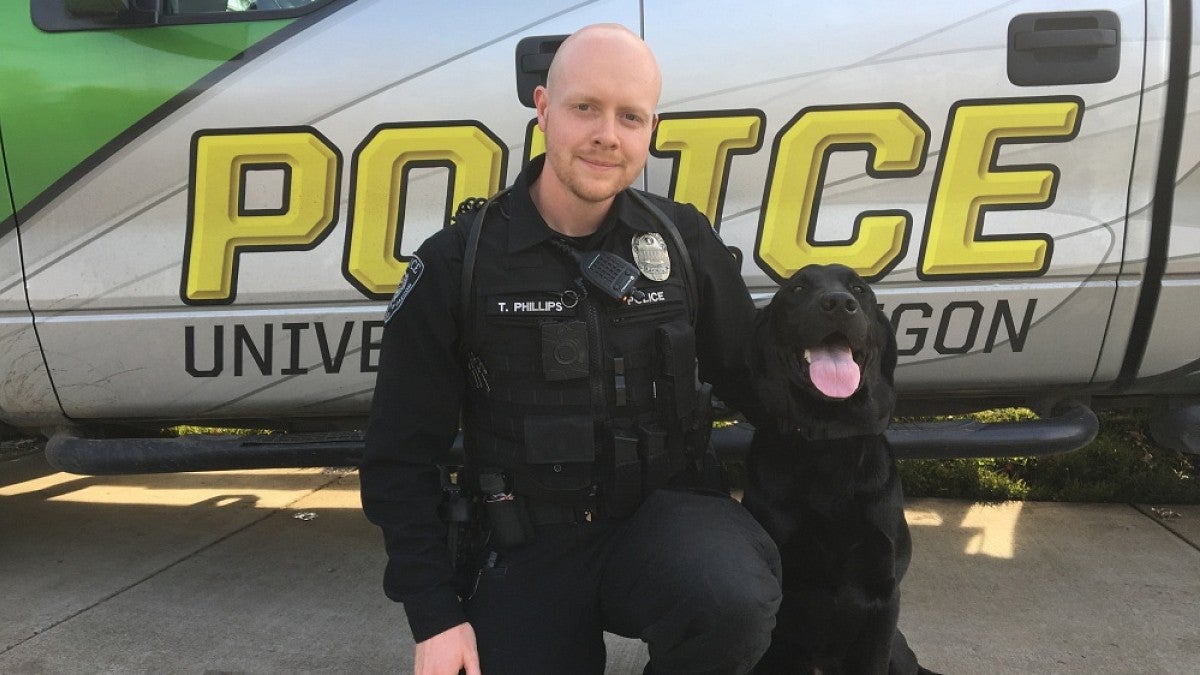Starting this week the University of Oregon has a new police officer — one with his own water bowl and collar.
Onyx, a 3-year-old black Labrador rescue dog, and his handler, officer Troy Phillips, completed an out-of-state police dog training program weeks ahead of time and will be starting work on campus soon. The dog was named for both the Onyx Street that runs through campus and for his deep, shiny black color.
The UOPD K9 officer project was an early goal for Chief Matt Carmichael after he arrived on campus in September 2017.
The chief wants to be clear: Onyx is not a "bite" dog, one that chases and corners fleeing suspects. He's also not a narcotics dog, sniffing out drugs. The K9 has two critical duties: explosives detection and community engagement.
"Engagement is, by far, the main part of the dog's work," Carmichael said. "He's there for outreach to students. In my experience it's a great icebreaker, a great conversation starter. We want our students to feel comfortable and positive about their police, and a friendly dog is a great ambassador."
The more serious part of Onyx's duties, and the one that required the intensive training, is sniffing out explosives; he is also trained to detect firearms by sniffing out the small explosives in ammunition. There are few dogs in Oregon with that skill set, and they are not always available, especially on short notice.
"Here at the university we have a lot of large, complicated and high-profile events," Carmichael said. "Not to mention short-notice dignitary visits or gatherings in large public spaces with lots of people coming from outside the UO. We need to be able to adequately search our spaces for dangerous items and not count on other agencies alone."
That availability was important to the Department of Intercollegiate Athletics, which partnered with UOPD to develop the K9 program.
Onyx and Phillips have spent the last seven weeks in the Law Dogs police canine training course, at the Sacramento Police Academy in California. Program completion is typically closer to 12 weeks, but Onyx mastered the skills quickly enough to graduate ahead of schedule. The dog has a degree of sorts: certified by California Peace Officer Standards and Training in explosives detection and obedience.
Phillips will start by introducing Onyx to campus and getting him familiar with the environment, work expectations and people. Phillips asks students and members of the campus community to please ask first before greeting Onyx, so Phillips can make sure the dog follows directions and keeps his enthusiasm in check.
"Onyx really is very friendly and looking forward to greeting his new friends," Phillips said.
Phillips feels that Onyx was a bit of a natural, but he just needed direction.
"From the start Onyx was full of energy and incredibly eager to work and play, but he lacked focus and never stopped moving," Phillips said. "Once we were able to focus that energy into his training, Onyx has really transformed. All of that energy and excitement made him incredibly sharp and eager when detecting and allowed him to search constantly during evidence searches. He's definitely a natural athlete."
Phillips said it's incredible what a dog like this can do when given a chance, from detecting an explosive the size of a thumbnail to locating a shell casing in a football field and making it look easy.
"On one of our last evidence searches with Onyx, he alerted on a patch of grass approximately four square feet with deep, tangled grass and weeds," Phillips said. "I and another handler spent about 10 minutes searching for the evidence and almost gave up. Thankfully I was reminded to 'trust the dog,' and given a second thorough examination we found the evidence, concealed from our view but easily found by Onyx's incredible nose. I think that lesson will stick with me. Trust the dog."
—By Kelly McIver, University Communications


